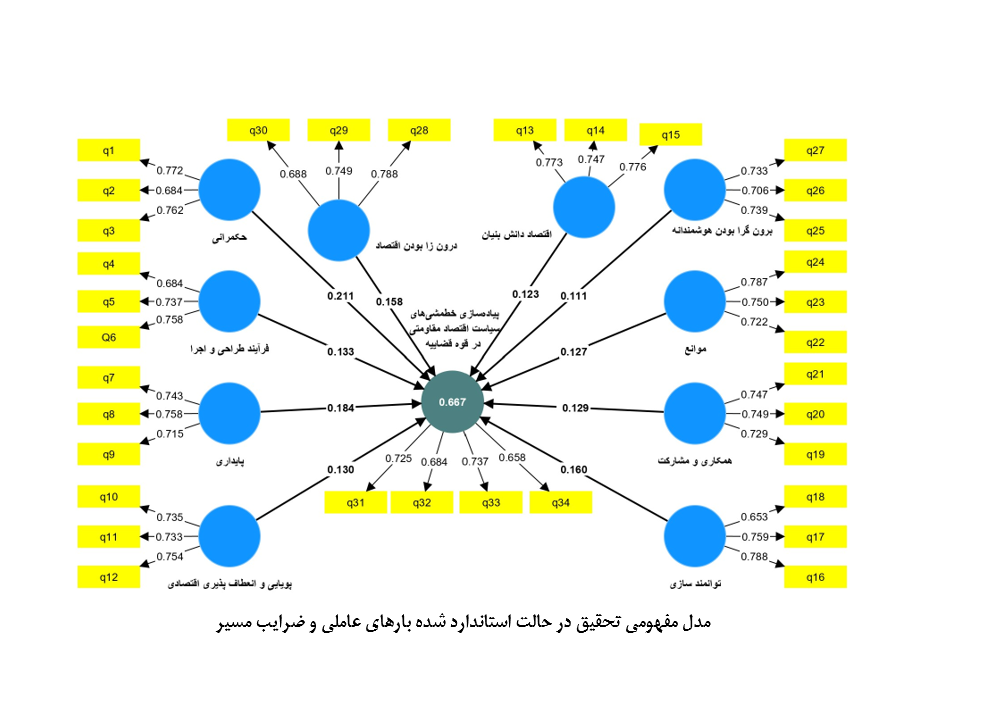تأثیر عوامل مؤثر بر اجرای موفق خطمشیهای اقتصاد مقاومتی در قوه قضاییه
کلمات کلیدی:
خط مشی, سیاست اقتصاد مقاومتی, قوه قضائیه, حکمرانیچکیده
در دنیای پیچیده و متغیر امروز، نظامهای اجتماعی و سیاسی با تحولات شتابانی روبرو هستند که نیازمند تطبیق پویا و استحکام بیشتر در تمامی بخشهای حاکمیتی است. در این میان، اقتصاد مقاومتی به عنوان یکی از محورهای راهبردی توسعه کشورهای مستقل و خودباور، نقشی کلیدی در تحقق استقلال اقتصادی، تقویت توان داخلی و مقابله با فشارهای خارجی ایفا میکند. لذا، پژوهش حاضر با هدف بررسی تأثیر عوامل مؤثر بر اجرای موفق خطمشیهای اقتصاد مقاومتی در قوه قضاییه انجام شده است. روش پژوهش برحسب نوع داده، کمی و از نظر هدف کاربردی است. جامعه آماری نامعین در بخش کمی 365 نفر قضات مجرب، معاونان و مدیران قوه قضاییه، کارشناسان حقوقی-اقتصادی، عضوان شوراهای نظارتی از به روش در دسترس است. برای گردآوری دادهها از ابزارهای پرسشنامه محققساخته استفاده شد. پایایی از طریق پایایی ترکیبی و آلفای کرونباخ سنجیده شد. رویکرد مدلسازی معادلات ساختاری با نرمافزار PLS4 بهره گرفته شد. نهایت، یافته نشان دادند که بین عوامل حکمرانی، فرآیند طراحی و اجرا، پایداری، پویایی و انعطاف پذیری اقتصادی، اقتصاد دانش بنیان، توانمند سازی، همکاری و مشارکت، موانع، برون گرا بودن هوشمندانه، درون زا بودن اقتصاد بر پیادهسازی خطمشیهای سیاست اقتصاد مقاومتی در قوه قضاییه رابطه معنیداری وجود دارد و الگوی طراحیشده از تناسب قابل قبولی برخوردار است. جهت تحقق اهداف این سیاستها، نیازمند توجه جدی به این عوامل و اصلاحات ساختاری و راهبردی متناسب با آن است.
دانلودها
مراجع
Paighami A, Samieinasab M, Soleimani Y, Seyyed Hosseinzadeh Yazdi S. Essays on the Resilient Economy: Iran's Economic Sanctions, Foundations, Dimensions, and Solutions. Tehran: Imam Sadiq University Press; 2015.
Rizaneh J, Fazeli MJ. The strategic role of the judiciary in the resilient economy. Entrepreneurship Index. 2018;3(7):86-99.
Mahboubi H, Fazeli A. The role of the judiciary in achieving the goals of the resilient economy. Tehran2014.
Elokaby MA. Development of cybersecurity laws in Egypt and its impact on the judicial system (Opportunities and challenges). International Cybersecurity Law Review. 2024:1-22. doi: 10.1365/s43439-024-00132-2.
Schulzke M, Caroll AC. Culture and the court: The judiciary as an arbiter of cultural disputes in the USA. Cultural Studies and the'Juridical Turn': Routledge; 2018. p. 363-88.
Rubasundram GA, Rasiah R. Corruption and good governance. Journal of Southeast Asian Economies. 2019;36(1):57-70. doi: 10.1355/ae36-1f.
Zandi Khvari S, Hosseini M, Mostahfezyan K, Khavarash. Developing a model for public policy-making indicators in the sports of the Islamic Republic of Iran. 2025.
Keshavarian Azad E, Etebarian Khorasgani H, Peykani H, Mehrban, Shahnooshi. Designing a model for implementing judicial policies in the country's judicial institution. Public Management. 2022;14(1):129-64.
Tew Y. Strategic judicial empowerment. The American Journal of Comparative Law. 2024;72(1):170-234. doi: 10.1093/ajcl/avad040.
Kochel TR, Skogan WG. Accountability and transparency as levers to promote public trust and police legitimacy: Findings from a natural experiment. Policing: an international journal. 2021;44(6):1046-59. doi: 10.1108/PIJPSM-04-2021-0062.
Silva J, Silva A, Araújo A, Silva A. Agile Project Management in Government Software Development: Addressing Challenges in Education Public Policy. 2025.
Lv DD, Cho E. Carbon-zero agility: Enabling carbon-zero organizations through agile management and ambiguous feedback algorithms. Environmental Modelling & Software. 2024;177:106062. doi: 10.1016/j.envsoft.2024.106062.
Sánchez Ramírez S, Guadamillas Gómez F, González Ramos MI, Grieva O. The effect of digitalization on innovation capabilities through the lenses of the knowledge management strategy. Administrative sciences. 2022;12(4):144. doi: 10.3390/admsci12040144.
Buchwald EM. Goal setting as the core of strategic planning. Bulletin of the Institute of Economics of the Russian Academy of Sciences. 2025(1):7-23. doi: 10.52180/2073-6487_2025_1_7_23.
Quaranta FR. Innovation and Digitization of the Justice System. 2023.
Dovers S, Hussey K, Clement S. Environment and sustainability: a policy handbook: The Federation Press; 2024.
Rousta A, Allaf Jafari E. Impact of environmental knowledge, responsibility and concern on sustainable consumption behavior: does customer attitude matter? Management of environmental quality: An international Journal. 2024;35(8):1858-77. doi: 10.1108/MEQ-06-2023-0166.
Rostovschikov IV, Aleshkova IA, Molokaeva OK. Judiciary Power and Information Society: New Approaches and Opportunities. Ubiquitous Computing and the Internet of Things: Prerequisites for the Development of ICT2019. p. 185-93.
Radhanpurwala S, Trivedi N, Pandya J. Influence of External Factors upon the Judiciary. Issue 2 Indian JL & Legal Rsch. 2023;5:1.
Squatrito T. Judicial diplomacy: International courts and legitimation. Review of International Studies. 2021;47(1):64-84. doi: 10.1017/S0260210520000352.
Kotter E. Planning and Goal Setting. AI Implementation in Radiology: Challenges and Opportunities in Clinical Practice: Springer; 2024. p. 33-50.
Osewe JO, Gindicha JY. Effect of training and development on employee satisfaction: a case of the judiciary of Kenya. European Journal of Humanities and Social Sciences. 2021;1(3):661-7. doi: 10.24018/ejsocial.2021.1.3.50.
Njuri G. Organization culture and performance of the judiciary in nyeri county, kenya. Nairobi: Kenyatta University; 2019.
Mo J. Promoting Whole-Process People's Democracy following the Rule of Law. Frontiers L China. 2022;17:567.
Morgado M, Lopes C, Morgado S, Freire I, Fonseca O. People Centeredness. 2018.
Li Q, Zeng Fe, Liu S, Yang M, Xu F. The effects of China's sustainable development policy for resource-based cities on local industrial transformation. Resources Policy. 2021;71:101940. doi: 10.1016/j.resourpol.2020.101940.

دانلود
چاپ شده
ارسال
بازنگری
پذیرش
شماره
نوع مقاله
مجوز
حق نشر 2025 Mohammad Reza Shahriari (Author); Alireza Rousta (Corresponding author); Seraj al-Din Mohammadi (Author)

این پروژه تحت مجوز بین المللی Creative Commons Attribution-NonCommercial 4.0 می باشد.










